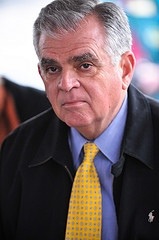
Well, maybe it’s not the end of
“favoring motorized transportation”
just yet.
(Photo: J. Maus)
Here’s the news that caught our eyes this past week…
– Enrique Penalosa has lost his bid for re-election as Mayor of Bogota, Colombia. Penalosa is widely hailed for his work in making Bogota more biking and walking friendly. He spearheaded the “Ciclovias” that were widely adopted around the world and which served as inspiration for Portland’s Sunday Parkways.
– U.S. Secretary of Transportation Ray LaHood — who won many fans in the bike world when he declared the “end of favoring motorized transportation” — has stated that the federal government will be involved “big time” in the Columbia River Crossing project and that it is a “classic example of what America has always been known for: doing big things.” Many local residents are concerned about Oregon and Washington states’ financial commitment to expand the bridge and surrounding freeways when both states are already making major budget cuts in other areas.
– Speaking of budget cuts, Gov. Chris Gregoire suggests the State of Washington may need to stop paying its share of school transportation money. Perhaps Seattle Public Schools, which would see $15.7 million removed from their budget if that happened, might want to start a few bike trains of their own.

– In his new book, Former GM Vice Chariman Bob Lutz says the federal government should enact a new $0.20-$0.25/gallon federal gas tax and suggests the profits from the tax be used to upgrade America’s railroads.
– An effort by Senator Rand Paul (R-KY) to eliminate federal funding for biking and walking projects has failed. One official believes it will be very difficult to eliminate this funding, as Sen. Paul proposed, because of its popularity with local officials and constituents.
– Despite calls for more freeways, the U.S. Department of Transportation has reported that travel on U.S. roadways has dropped 1.3% from a year ago and is at its lowest level since 2003.
– Meanwhile, vehicle crashes are costing the Chicago region $11.3 billion annually, which breaks down to $1,180 per person per year and is greater than costs associated with the area’s notorious traffic congestion.
– If the cost of crashes isn’t enough to steer you away from driving, the Los Angeles Times reports on how “buy here, pay here” used car dealers are exploiting people who think they need a car but have bad credit.
– Although the “cash for clunkers” program motivated some consumers to trade in their old fuel-inefficient vehicles, it now appears the program didn’t do much, if anything, to help the U.S. economy or the environment.
– Shifting from cars back to bicycles, Toyota has funded the development of a bicycle that shifts gears by remembering your location and monitoring your brainwaves.
– Google has announced it will charge for “heavy use” of Google Maps’ API at the start of 2012. The move will impact sites and applications with more than 25,000 views of a built-in Google Map per day, which will have to pay $4 per 1,000 additional views. Some are concerned that this will hurt popular bicycling websites but Google maintains the fee will affect only 0.35% of the over-all highest-traffic websites and applications using the API.
– One protester from Occupy Santa Rosa found the city’s bike obelisk to be taller than he expected. After climbing to the top to hang a “Don’t tread on me” flag he ran out of energy and had to be rescued by a firetruck from the top of the 65-foot tall sculpture.
– Tim Blumenthal, President of Bikes Belong, believes Minnesota’s bicycle tourism industry is gaining momentum.
– Shhh! I’m going to tell you a “secret”: riding a bike is good for your health. NPR and others are realizing this after a study by researchers in Wisconsin was released showing that replacing a few short car trips with a bicycle ride can have huge benefits for you, for the public, and for the economy.
– And if slimming down isn’t enough of a motivation to get on a bike, check out how much it’s costing you to commute in a car.
Did you find something interesting that should be in next week’s Monday Roundup? Drop us a line.

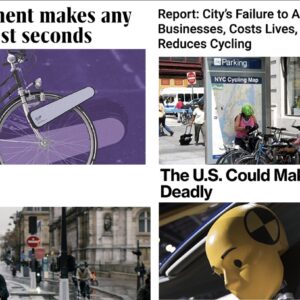
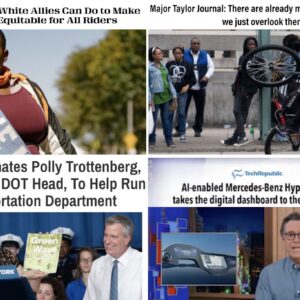
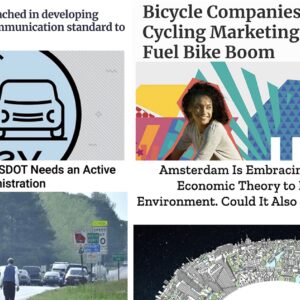
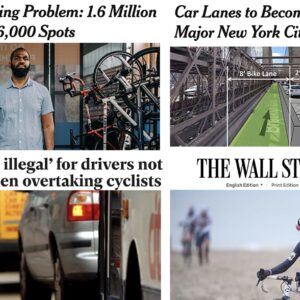
Here’s the comment I posted over at the Cash For Clunkers article/link:
What the authors of the report don’t seem to have included in their analysis is the affect a government program has on the way the public understands the predicaments we’re in. In light of the looming climate crises, buying a new car, which the program elevated to the status of a responsible/patriotic/environmental act, is questionable at best. Instead of encouraging the buying of cars, we need to figure out how to phase out our dependance on cars, on internal combustion engines.
Not only does this framing of the problem elevate economic concerns above environmental ones, it obfuscates the manner in which our economic model: consumption-growth-all will turn out fine is fundamentally at odds with the environmental situation(s): any CO2 dug up and burned in cars, furnaces, power plants is only hastening the day of reckoning when it comes to climate changes we will regret. If as some are arguing (350.org; carbontracker.org; monbiot.com/2007/12/11/rigged/ ) we would do well to leave all the remaining carbon in the ground, then encouraging the buying of cars–any cars–is not just risky but nuts.
Just think of what a very differently framed program could have accomplished. Instead of cash for clunkers, cash for carfree living. In my community–a large metropolitan city in the Pacific Northwest, 18% of households did not own a car according to the 2000 census/ACS. These 18% may as well be invisible when it comes to policies around transportation, never mind incentives. No one pays them any mind, recognizes the important work/experience/leadership these folks represent. We’ve never even thanked them.
What if we’d given these individuals and households an amount of money equal to what a cash for clunkers participant received, and asked them to encourage their friends, neighbors, relatives to try living without a car? What if the federal government went to the trouble, first, of learning from these people what it is that they do/how they get around, and then put together a curriculum for replicating these lessons and experiences, which the aforementioned recipients could use in their outreach efforts?
The RFF study is appreciated but it did not go nearly far enough.
OK, looks like more letter writing for me; Inhofe got the memo, but looks like Coburn missed it. Also, seems like there’s something wrong with the moderation system; been seeing a lot of hung comments and people mentioning their comments are also hung…
With Google starting to charge for API requests, I predict a sudden uptick in OpenStreetMap usage. I’m OK with this.
I’m actually not too concerned about the GMaps thing, even for cycling sites. If your cycling site is generating 25,000+ hits per day, you can easily make enough from ad revenue to pay the $4/1000 overage.
Or sites that people already pay for (like Strava for example, which is $6/mo for the Premium version), they can probably eat the surcharge.
However, I would expect Bing maps to jump on this and try to get large sites to switch.
I think Bing is in a weird transitional stage right now in terms of maps. They’re currently licensing their aerial photography to OSM, which has been leading to rumors that they may drop their internal cartography for OSM some time in the future.
Well, at least in the Portland area, the map quality for OpenStreetMap is much higher than Google Maps, largely thanks to the TriMet interns doing such a bang-up job importing Bike There and other contributions from OSM users on the ground. Considering OSM is free and GMaps won’t be, more or less means you’re paying more for a worse product in this case.
I predict you are right.
Unfortunately it will be like the slow Linux overtaking of MS Windows.
Scream and yell as some might Google is offering a good product for the price even if the are going to charge heavy users some marginal fee for its use.
I’ve worked with maps since I was 5 years old – following and navigation assistance with a big Rand McNally US Atlas. I can appreciate the Open Source goodness of OpenStreetMap but right now it looks as clunky as a crappy Triple A map and lacks all the POI data the that Google Maps has.
Not to say that OpenStreetMap can’t improve and overtake Google Maps its just that even as Linux distros have gotten more user friendly and accessible to the mundanes they still have a long way to go in displacing MS products dominance of the professional marketspace and thus MS’s defacto usage at home as well.
Even with exponential growth the Open Source software movement has a long fight.
Well, keep in mind that the map you see on openstreetmap.org is just a demonstration rendering and is no means a definitive example. You have maps like http://rtp.trimet.org/ and http://open.mapquest.com/ that take the same data you see rendered at openstreetmap’s homepage and give it a more practical frontend.
As far as POIs are concerned, yes, that’s a little bit of an issue in the US still. The easiest way to help fill in the blanks is with the MapZen tool for iPhone and Android devices. You’ll need an account on openstreetmap.org to use it, but the POIs you create in that app get entered directly into the map data and get pushed out to data consumers in a matter of minutes.
Jonathan, it would be good to see you interview LaHood about his CRC support. I just don’t get it.
I might. But I don’t think that’s the right thing for me to do at this point. What I have done is to email my contact at LaHood’s office asking for a clarification about the quote.
let me clarify. the most direct way to stimulate the cash economy is to hire a bunch of construction people on public works projects. period.
I got the impression that LaHood was talking at a photo op saying what he thought we would want to hear, without knowledge of widespread local opposition.
bingo.
Simply because his administration supports the building of a single bridge doesn’t mean he’s against non-motorized transporation. The city is easily big enough for both. Do some of you folks actually believe cars are going to disappear and require no increased infrastructure in your lifetime? your childrens lifetime?
“Do some of you folks actually believe cars are going to disappear and require no increased infrastructure in your lifetime? your childrens lifetime?”
In effect, yes.
I wouldn’t say disappear–their usefulness will atrophy at a rapid clip. As for the absence of need for increased auto-only infrastructure. Absolutely.
Perhaps you will allow me to ask: what evidence do you have/can you point us to that this will not be the case?
no one has ever said the bridge was ‘auto only’ have they?
You didn’t answer my question.
As for whether the bridge is auto only, well, what do you think?
If we took the lessons of the Peak Oil Task Force and others who are looking past next quarter, pork, polls to heart we could do lots with the existing bridge to make it more multi-modal. Or we could sit back and do nothing (wrt to the bridge) and in a few short years take note of the atrophying rate of car traffic across it (something Joe Cortwright has already alerted us to) and *then* steal a lane for bikes, light rail or the non-car flavor of your choosing.
peak oil? you’re forgetting the current auto industry reaction to higher gas prices in the form of hybrid and electric vehicles. You’re also forgetting those vehicles are being bought up as fast as they’re made.
Cars have their place. Car infrastructure has its place. LaHood knows it. Again, it doesn’t infer he’s against non-motorzied transport as well. The second our politicians take sides is the second they become less effective for all they serve.
I’m not the least bit interested in the auto industry’s reaction to higher gas prices. That isn’t the issue. The trends I and many others are talking about are not on the politicians’ radar because they don’t get it (yet) or are in denial.
Here’s something you might enjoy: http://tinyurl.com/29jtgtw It is a nice overview of how other cities and countries are anticipating the end of (the usefulness) of cars. Which isn’t the same thing as I’ve been talking about, but it is related.
As for your fear that ‘politicians dare not take sides,’ what sort of coded language is that? They (our US politicians) are continually taking the side of putting their head in the sand and pretending that this all doesn’t concern us, that we can just keep on trucking. Ha. If we weren’t talking (apparently seriously) about a $3B or $5B CRC it would be funny.
Jeff, I asked:
“what evidence do you have/can you point us to that this will not be the case?”
You answered:
“Cars have their place. Car infrastructure has its place. LaHood knows it.”
With all due respect, that is not evidence but an assertion.
You assume cars will continue to run on gasoline. They won’t. Renewable energy will power cars within the next 2 decades, and a whole lot of people who drive but feel a little guilty about it will lose their disincentive. Peak oil’s impacts on vehicle miles traveled will be a statistical anomaly in the long term.
In two decades cars won’t be running on anything. I suspect we’ll consider ourselves lucky if we still have a functioning electric grid in 2032.
The renewable electricity powered transportation system is (becoming) a familiar fantasy. And I predict it will go the way of the nuclear-powered transportation system fantasy and the ‘everyone will fly their personal plane’ fantasy.
Wood-fired cars such as were developed mostly in 1940s Europe are I think a far more likely technological trajectory for 2032, but I put my money on human powered solutions.
Yawn. The peak oil apocalypse has been “any day now” since I first heard about it in 2004.
Peak Oil may very well not be the death of the automobile as dominant mode of transport for the over-industrialized world. It may well be climate change. Either is more than enough, and we don’t get to choose which one. It may be both.
A 12-lane freeway might as well be; so far the CRC plans have all included bicycle infrastructure as an afterthought, and less straightforward than the existing substandard infrastructure on the existing Interstate Bridges.
The problem is Jeff, that LaHood seems to be victim of same PR spin as many others — that the CRC is about “building a bridge.” The CRC is a massive freeway and interchange widening project that includes a bridge.
The USDOT Sec can hold a lot of sway in terms of public opinion and in terms of CRC boosters using it as leverage that it “must be built!”… That’s why federal officials usually don’t go on record about local projects that have been controversial.
I also think LaHood’s comments are important because he has given so much hope and big speeches to bike advocates… And the bottom line is that officials cannot just say big things about bicycling and non-motorized transportation unless/until they are will to say we must change the status quo for motorized transportation — and in this case, building the CRC is all about the status quo.
Why must that dichotomy exist in your image?
Officials, good government officials focus on finding solutions to problems through a number of different solutions and for a number of different groups.
I fail to see how automobile use on an interstate freeway widening and bridge has anything to do with supporting (financially or otherwise) non-motorized travel infrastructure. A car has its place and use. A bike has its place and use. Its not always about substituting one for the other. From reading this blog occasionally, I know you travel a little Jonathan so I would think you’d have a better grasp on the reality that most people in this country don’t want to ride a bike. The portland bike bubble doesn’t exist in most other places and a car is, by far, the preferred method of transport for the strong majority of people.
I love this city and have lived here for well over 35 years. A bridge won’t change that fact, nor will it detract from the quality of life any of us have here. As it should be, the CRC will live or die by it’s final cost, not because a bunch of cyclists (the majority of whom probably never even cross I-5) want to deincentivize auto use and/or change the local status quo as they see fit.
If you’re concerned about the cost, I”m with you 100%. If this is about wanting to be heard and recognized and make a stake holder in the project, that’s fine too. But getting disenfranchised with LaHood (a politician), who recognizes the importance of supporting infrastructure for all modes of transportation, seems rather improvident.
“…most people in this country don’t want to ride a bike.”
Really?
That is about as useful as saying ‘most people in this country want to be overweight.’
Trying to infer what people-as-citizens want from their aggregated consumer preferences is a fools’ errand. The fact that the car is the dominant mode of transport, or that fast food is the dominant way of eating does not ipso facto mean that people wouldn’t prefer healthy food or the kind of transport system that the Europeans or the Colombians (tend to) have–they (we) somehow managed to forfeit our ability to have any meaningful choice in the matter. Our money doesn’t go to multi-modal, people-centered infrastructure it goes to fight wars over oil.
CRC:
What are implications for the CRC project and/or Oregon’s budget/bond rating if Oregon lawmakers pass some resolution not to pay for it any further?
It is not a big stretch of the imagination to predict that some time soon all the lawmakers will be screaming that we can’t afford to pay for the CRC.
The U.S. government, with the bridge being part of the federal highway system and a key link for I-5 north-south freight transport, might decide to go ahead and build the CRC despite Oregon, and maybe Washington state too, possibly deciding not to pay any more for the bridge.
With the U.S. getting out of the war in Afghanistan, it might try justifying spending on projects like the CRC, as ‘building the economy’ by putting people to work.
Here’s ‘are’ up above, saying something along those lines:
http://bikeportland.org/2011/11/07/the-monday-roundup-152-61580#comment-2139704
Here’s another good story on urban freeway expansion I saw last week (on the excellent Daily Sightline blog), this time in Eugene:
http://www.eugeneweekly.com/2011/11/03/news1.html
It’s all about a, “Regional Transportation Plan (RTP) that would largely ignore local concerns about global warming, livability and urban sprawl by investing $1.5 billion in highways over the next two decades.” And it contains an impressive list of freeway expansion projects that are in the works all over Eugene.
OK, what about the space they use up?
what about it? cars aren’t going anywhere. they may get slightly smaller, they may run on electricity or a combination of gas and electrons, but they are not going to disappear nor will our freeways get much less crowded at rush hour in our lifetimes. Portand and the surrounding areas continue to grow steadily with or withour recession driven blips on the radar.
Jeff,
I don’t get the impression that you understand the biophysical underpinnings of our auto-dominated society, what is required to make it go. Given the energy intensity and scale of our transport system, you (or GM or Ray LaHood) can’t simply snap your fingers and will into existence some alternative fuel/infrastructure/fleet that will substitute for the oil pigs we have gotten used to. Even twenty years isn’t enough to pull that off.
Your ‘they may run on….or… ‘ comment suggests that you are not overly concerned with the details of the future of transportation fuels. I am very concerned and don’t think the prospects look good (for private vehicles).
Fortunately they do still look good for human propulsion.
an assertion that is backed up by the very fact that the Secretary of Transporation openly supports the project, as do many others.
“an assertion that is backed up by the very fact that the Secretary of Transporation openly supports the project, as do many others.”
That’s a good one, jeff.
Politicians are constantly in favor of stupid things they/we later regret. In California and Germany and Japan these are called stranded assets. Nuclear power plants being a prime example. Very expensive bits of infrastructure paid for with public money that we later regret. The ‘stranded’ part comes about when we realize our mistake but can’t undue it.
Oh, and the tax payers get to foot the bill going up, and coming down. Yippee. Thanks, Ray LaHood!